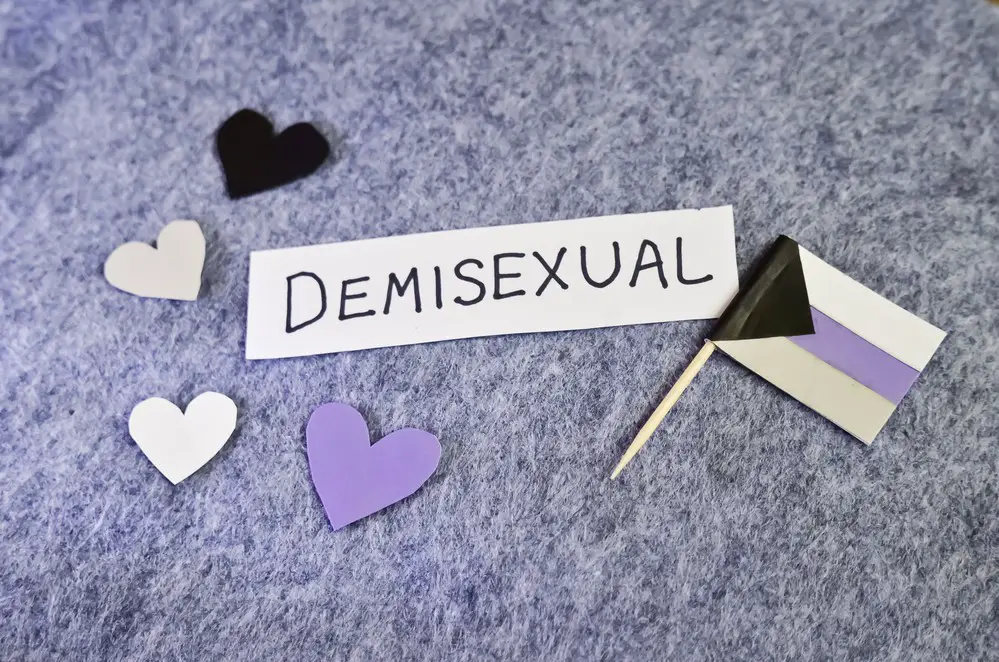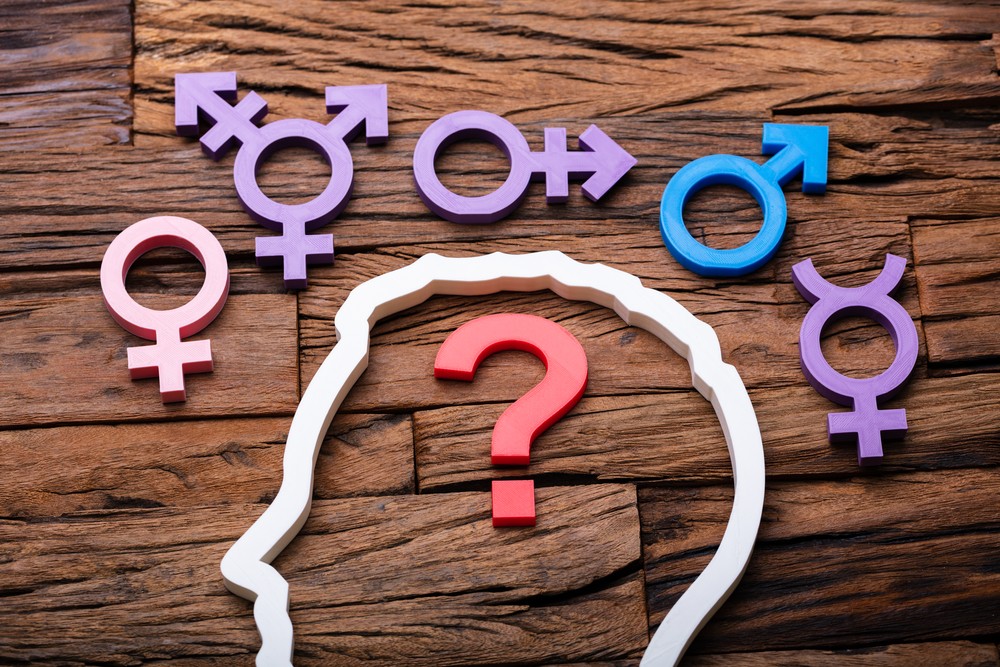As a BetterHelp affiliate, we receive compensation from BetterHelp if you purchase products or services through the links provided
Demisexuality is a lesser-known term within the sexuality spectrum, but it is an important one. It refers to individuals who do not experience sexual attraction until they have established a strong emotional bond with someone. Demisexuals can experience deep and lasting romantic love like anyone else, but the journey to reaching that love might look slightly different.
For a demisexual, the timeline for falling in love can be variable, with a reliance on forming deep emotional connections. This means that falling in love might take longer than someone who experiences sexual attraction right away. However, it’s important to remember that each demisexual person is unique, and the timeline for falling in love will ultimately depend on individual experiences and the nature of the relationship.
Key Takeaways
- Demisexuality involves experiencing attraction only after a strong emotional bond is formed.
- The timeline for falling in love can be longer for demisexuals due to their reliance on emotional connections.
- Individual experiences and relationship dynamics influence the time it takes for a demisexual person to fall in love.

Understanding Demisexuality
Demisexuality is a sexual orientation that falls under the asexual umbrella, but it’s not the same as asexuality. As a demisexual, your experience with sexual attraction is different from the majority. When it comes to falling in love, it’s vital to recognize and understand the nuances of your identity.
Being demisexual, you only experience sexual attraction after establishing a strong emotional connection with someone. This connection can be built through friendship, trust, and appreciation for the person’s character and qualities. It’s essential to note that demisexual people can still experience primary attraction, usually based on appearance. Still, secondary attraction ─ the emotional bond ─ is necessary for any sexual feelings to develop.
The spectrum of sexuality is wide, and graysexuality is another term you might have heard. Graysexual individuals are somewhere between asexuality and sexual orientation and experience sexual attraction. To clarify, graysexuality is a broader term that can encompass demisexual experiences as well.
Recognizing your identity as a demisexual is crucial to understanding your journey in love and sexual attraction. It’s important to be patient with your relationships and to be open to building strong emotional connections. Remember, every individual’s experience with demisexuality may be slightly different, but acknowledging this aspect of your life will help you navigate and embrace your unique connections with others.

Emotional Connection in Demisexuality
When you identify as demisexual, it’s important to understand that an emotional connection plays a crucial role in developing romantic and sexual attraction. Emotional intimacy is key for you, and without it, you may not experience the same romantic or sexual attraction that you would otherwise.
Establishing deep friendships is a vital part of your journey as a demisexual. You can often form emotional bonds through these relationships, leading to deeper connections and, eventually, romantic attraction. Don’t shy away from building friendships, as they are the foundation of your emotional life.
As a demisexual, developing intimacy takes time. It’s important to be patient and nurture your relationships. The emotional bond you form with others is essential in creating a sense of security, trust, and comfort. As this bond strengthens, you may experience romantic or sexual attraction towards your partner. Remember that every demisexual’s journey is unique and that there is no specific timeframe or “rule” for when attraction may occur.
Your emotional and intellectual connections go hand-in-hand. Sharing thoughts, ideas, and beliefs with someone can pave the way for a deep emotional attraction. Through these shared experiences, demisexuals often find themselves drawn to others, as intellectual connection adds another layer to the emotional bond.
In short, your journey as a demisexual is heavily influenced by the emotional connections you make with others. Friendship, intimacy, and emotional bonds significantly influence your romantic and sexual attractions. By fostering close relationships, you create space for emotional and intellectual growth, allowing your unique demisexual experience to thrive.

Demisexual Love and Relationships
Regarding love and relationships, demisexuals might take longer to fall in love than others. It’s essential to remember that demisexuality is a preference, not a rigid set of rules to follow. Everyone’s experience will be different, but this article will give you a general idea of how long it can take for a demisexual to fall in love.
As a demisexual, you might find dating challenging since you need a strong emotional connection before feeling a romantic attraction. This means that typical dates, like going out to a movie or dinner, may not be enough for you to develop romantic feelings. Instead, you might find that spending quality time and building a strong relationship with someone as a friend is more appealing to you.
In a demisexual love journey, a platonic friendship often serves as the starting point. You might start as friends or even acquaintances, and as you get to know the person more, the emotional connection deepens. This deepening connection could develop romantic feelings, or what some might call a “crush.” It’s important to note that falling in love can take weeks, months, or even years, depending on the individuals involved.
Both male and female demisexuals share the same approach to love and relationships. In most cases, gender does not significantly affect how long it takes them to fall in love. Instead, the focus remains on building that emotional connection, regardless of the gender of the involved parties.
While finding a deep connection isn’t always easy, don’t be disheartened. Take your time to form genuine friendships and see where they lead without rushing into romantic relationships. Patience is vital for demisexuals, as the key to a successful, long-lasting relationship or marriage depends on forming a strong emotional bond with a partner.
Remember to communicate openly with your friends, dates, and partners about your demisexuality. Understanding and explaining your preference to others will help you navigate the dating world and ultimately lead you to a loving, fulfilling relationship that works best for you.
Navigating Demisexual Attraction
When you’re demisexual, understanding and recognizing attraction can be a different experience than others. It might take time to feel a strong connection, but don’t worry. That’s perfectly normal for demisexuals. In this friendly guide, we’ll help you navigate the signs and signals of demisexual attraction.
Developing an emotional bond is essential for demisexuals before experiencing a strong attraction. You might not feel instant chemistry or physical attraction when you meet someone new, and that’s okay. Take time to get to know the person, build trust, and enjoy deep conversations. The more connected you are emotionally, the more likely you’ll start feeling attracted to them.
Since demisexuals typically don’t engage in traditional flirting, you might find it hard to understand if someone else is attracted to you. Pay attention to their body language, expressions, and communication. If they open up about their feelings or personal stories, it could be a sign that they’re interested in growing the bond between you.
Communication is key when it comes to demisexual attraction. Be honest with the other person about your demisexuality and your need for a deeper emotional connection. They will appreciate your openness, making your interactions much more authentic. Discussing your feelings and expectations will create a comfortable space for both parties.
Remember, there’s no fixed timeline for demisexuals to fall in love. Staying patient and giving the connection time to grow organically is essential. Trust your instincts and allow yourself to enjoy the process of building a meaningful relationship.
Demisexuality and Gender
When discussing demisexuality, it’s important to understand how it interacts with various aspects of gender and gender identity. Demisexuality is a sexual orientation where individuals only experience sexual attraction when they’ve formed a deep emotional bond with someone. This can happen regardless of gender, so it’s essential to consider the diverse range of identities when discussing this topic.
People of any gender identity, including male, female, and non-binary, can be demisexual. Your gender does not determine your demisexuality nor limit with whom you may establish an emotional connection. In the same way, demisexuality is not synonymous with being gay, lesbian, heterosexual, bisexual, pansexual, or queer, as it can coexist with these orientations.
For example, you might be a demisexual woman who only experiences sexual attraction to other women once a strong emotional bond has formed. In this case, you could identify as both demisexual and lesbian. On the other hand, a demisexual person who is not gender-specific in their sexual attractions might identify as pansexual or queer in addition to being demisexual.
Like any orientation, demisexual individuals can have various experiences based on their personal attractions and relationships. It is important to remember that demisexuality is a personal experience that varies greatly among individuals, and there isn’t a one-size-fits-all description. Be open to learning about different experiences and always approach the subject with a friendly and understanding attitude.
In summary, demisexuality transcends gender boundaries and can coexist with various other orientations. Your gender identity and orientation might influence how your demisexuality manifests, but those experiences are unique. Embrace and understand these differences as part of the broader spectrum of human sexuality.
 The Challenges of Being Demisexual
The Challenges of Being Demisexual
As a demisexual, you may face various challenges in different aspects of life, such as societal pressure, relationships, and self-identity. Falling in love may take longer for you, and that is okay. It is essential to acknowledge and embrace your experiences while navigating these challenges.
First, consider that societal pressures might lead you to believe that you must engage in casual sex or that finding love quickly is necessary. However, remember that your demisexuality means emotional connections are vital for you to experience sexual attraction. Thus, you don’t have to align with cultural norms if they don’t resonate.
Misconceptions about demisexuality can also cause confusion and self-doubt. People might assume that your lack of immediate sexual attraction means you’re just being “picky” or unusually low libido. You should remind yourself that demisexuality is a natural and valid way to experience love and attraction.
Setting boundaries is crucial for maintaining healthy relationships and managing your well-being. As a demisexual, you might feel conflicted about physical intimacy, especially if your partner desires sex more quickly than you. Communicating your needs to your partner and maintaining your boundaries is important.
Coming out as demisexual can be a daunting task. You might feel apprehensive about the reactions you’ll receive based on misconceptions of demisexuality. A supportive community and positive representation in media and culture can be essential to finding acceptance and understanding.
Mixed feelings about sex are common for demisexuals. You might feel pressured to engage in sexual activities, even when you feel uncomfortable. Embrace the fact that your preferences for sex and intimacy might be different from others, and that’s perfectly fine.
In conclusion, the challenges of being demisexual can be complex and personal. Remember that self-acceptance, open communication, and defining your boundaries will help you navigate your journey more confidently.
Demisexuality in the LGBTQ+ Community
As you navigate through the LGBTQ+ community, you might encounter individuals who identify as demisexual. Demisexuality is a unique orientation where a person experiences sexual attraction only when a deep emotional bond is formed. It is important to note that demisexuality exists along a spectrum, and every individual’s experience is different.
This orientation is often misunderstood within the LGBTQ+ community, but it is crucial to recognize and support demisexual individuals. Just like gay, lesbian, bisexual, transgender, and queer people, demisexuals are a part of this diverse community, and their experiences hold equal value.
Demisexuals can also have varying preferences of romantic partners. They may be attracted to the same gender (e.g., gay demisexual, lesbian demisexual), both genders (bisexual demisexual), or all genders (pan-demisexual). By understanding the complexity of their orientation, you can better empathize with and support demisexual members of the LGBTQ+ community.
It is key to educate yourself and others about demisexuality, as it fosters a more inclusive environment for everyone in the LGBTQ+ community. No one should feel left out or misjudged due to their orientation. By being a friendly and supportive ally, you can help create a more inclusive space for demisexuals and other members of the LGBTQ+ community alike.

Demisexuality and Other Sexual Orientations
When discussing demisexuality, it’s helpful to understand how it relates to other sexual orientations. Demisexual individuals, just like anyone else, can fall in love at different rates. Keep in mind that each person’s experience might differ.
Asexual individuals typically don’t experience sexual attraction, while graysexual individuals may experience it occasionally or under specific circumstances. Demisexuality falls within the asexual spectrum, as demisexuals usually need a strong emotional connection to feel sexually attracted to another person.
Pansexual individuals experience attraction to others, regardless of their gender identity. This attraction is not dependent on the emotional connection that demisexuals require. However, it’s possible for a demisexual person to also identify as pansexual regarding their romantic preferences.
On the other hand, allosexual people feel sexual attraction more frequently and don’t require a deep emotional bond. This differs from demisexuality, where the emotional connection is the main factor for attraction.
Homosexual individuals are attracted to people of the same gender. Like anyone else, they can experience varying attraction and personal preferences. Similar to pansexuals, demisexuals can also identify as homosexuals in terms of their romantic connections.
It’s important to remember that everyone’s experience with love and attraction is unique. As you learn more about these sexual orientations, consider how each one might affect how someone falls in love and develops relationships.

Demisexuality and Online Dating
Navigating the world of online dating can be a unique experience for demisexual individuals. As a demisexual, you may find that standard dating apps and websites lack some important aspects in forming meaningful connections.
In your journey, you might consider searching for platforms that focus on creating connections based on more than just physical appearances. For instance, apps that allow users to showcase their intelligence and interests could be more suited to your needs as a sapiosexual or demiromantic individual.
It would help to focus on building a strong emotional and intellectual connection with potential partners when using online dating platforms. Engaging in deep conversations and getting to know someone’s thoughts, values, and beliefs can help build that necessary bond. Don’t be afraid to ask insightful questions and share your experiences to foster this connection.
Moreover, remember that certain elements, such as voice and smell, which can contribute to your attraction, are difficult to perceive through online platforms. When you feel comfortable and have established a meaningful connection, consider transitioning to a phone call or video chat. This way, you can experience these important aspects more personally.
In summary, as a demisexual person, your love journey in online dating might take more time and effort. Focus on platforms that cater to your desire for deeper connections and prioritize communication. Embrace your unique dating experience, and remember to stay true to yourself.

The Emotional Weathervane: Signs You Might Need Therapy
Being a demisexual in a world dominated by different forms of attraction can sometimes feel like sailing through the fog—you know where you want to go, but the way isn’t always clear. The emotional complexities may suggest that therapy could be a helpful resource. Here are some signs that might point you in that direction:
- Navigating Ambiguity: If you often feel like a square peg trying to fit into a round hole—especially in relationships—therapy might help you understand it all.
- FOMO & Social Pressure: If you constantly feel you’re missing out or are compelled to keep pace with friends who seem soaring through romantic milestones, therapy can help you deal with that pressure.
- Emotional Overload: Demisexuality often involves profound emotional connections, and those can get intense. If you are overwhelmed, therapy could be a space to unpack those emotions.
Painting the Emotional Canvas: Goals for Therapy
Therapy is not just a space for venting; it’s a workshop for your mind, emotions, and even your love life. So, what can you aim to paint on your emotional canvas through therapy?
- Self-Understanding: Uncover the layers of your demisexual identity to understand your unique patterns of attraction and love.
- Communication Skills: Articulating your specific needs and boundaries is like painting on a canvas; it requires skill. Therapy can help you become more eloquent in expressing yourself.
- Emotional Balance: Just as a masterpiece needs both light and shadow, you’ll need tools to balance your emotional highs and lows effectively.
- Managing Social Pressure: Society’s timeline for love isn’t yours. Learn coping mechanisms to handle the weight of societal expectations.
From Milestones to Moonstones: Monitoring Progress in Therapy
Therapy is not just a pitstop; it’s a journey. Having some road signs is crucial to know you’re headed in the right direction.
- Journaling: Keeping a diary of your emotional states, breakthroughs, and sticky points can serve as your map in the therapeutic journey.
- Feedback Loops: A journey is best shared. Maintain an open dialogue with your therapist and trusted friends or family to gather outside perspectives on your progress.
- Introspective Checkpoints: Take time, perhaps every few weeks, to pause and reflect on what has shifted, what feels stagnant, and what needs more focus.
With these added sections, your article becomes a comprehensive guide that offers your readers depth, practicality, and encouragement. Therapy, like love, is an individual journey, and your article can serve as a valuable resource for those venturing into their emotional landscape.
PrideCounseling
PrideCounseling is an online platform designed specifically to cater to the mental health needs of the LGBTQ+ community. By offering therapy from LGBTQ+ specialized therapists, you can feel at ease knowing that the person guiding you understands your unique challenges as a demisexual person.
One of the best things about PrideCounseling is its flexibility in scheduling therapy sessions. You can choose from various modes of communication, such as:
- Text messages
- Phone calls
- Online chat
- Video sessions
This way, you can select the option that suits your needs and comfort level. Imagine getting support without leaving your home; therapy has never been more accessible.
The licensed therapists at PrideCounseling are not only well-versed in LGBTQ+ issues, but they also understand the nuances that come with being demisexual. They can help you navigate the complexities of love, relationships, and the time it may take to form a deep emotional connection with someone.
While the process of falling in love varies greatly from person to person, having access to a mental health professional who understands the intricacies of demisexuality can make your journey a more fulfilling one. Make sure to take advantage of the fantastic resources PrideCounseling has to offer and embark on the path towards better mental health and self-awareness.
Frequently Asked Questions

What are common demisexual relationship challenges?
Demisexual individuals often experience unique relationship challenges, such as requiring a strong emotional bond before developing romantic or sexual attraction. This can lead to a longer “getting to know you” phase, which may cause impatience or misunderstandings between you and your partner. Communication is key in these circumstances so that both individuals know each other’s feelings and experiences.
How can frustration be managed in a demisexual relationship?
Managing frustration in a demisexual relationship comes from understanding, patience, and communication. Remember that it may take time for your demisexual partner to develop feelings of attraction, and it can be helpful for you to support them during this process. Encourage open conversations about your feelings and desires and try to empathize with your partner’s unique experiences.
What are some tips for dating a demisexual person?
When dating a demisexual person, being patient and understanding is essential. Focus on emotional bonding: share experiences, engage in deep conversations, and support each other’s hobbies and interests. Remember that physical intimacy may not be the main focus, so develop emotional closeness instead. Communicate openly and honestly about your feelings, and don’t rush the relationship development.
Can a demiromantic person experience breakups differently?
A demiromantic person may experience breakups differently from others due to the emotional connection they’ve established as the foundation of their relationship. Losing that connection could be particularly hurtful or challenging for them. You must be empathetic and supportive, even if the relationship has ended.
What is the difference between demiromantic and demisexual?
Demiromantic individuals form romantic connections only when they’ve developed a strong emotional bond with someone, while demisexual individuals experience sexual attraction in the same context. These terms emphasize the importance of emotional connections in both romantic and sexual aspects of a relationship.
How can one build a strong connection with a demisexual partner?
Building a strong connection with a demisexual partner may require more focus on emotional bonding than physical intimacy. Share experiences and engage in activities that bring you closer together, such as discussing hobbies and interests, attending events together, and having meaningful conversations. It is important to remain patient and understanding during this process, as it may take time for your demisexual partner to develop romantic or sexual feelings. Keep communication open and honest, and don’t hesitate to express your feelings and needs in the relationship.
About Jacob Maslow
After surviving the traumatizing events of 9/11, I took it upon myself to heal through helping others. I’m the primary caregiver of my children and understand from first-hand experience the lonely paths you have to walk as a partner and parent when leaving an unhealthy relationship.
We’re all echoing in a dark space that doesn’t have to be this empty, and that’s been my mission since finding solace and recovery in therapy: To help comfort others who are still in shock and at the prime of their struggle.
I came across BetterHelp after searching for this type of community. I wanted to belong to a body of proactive therapists and supportive therapy veterans that allowed me to see other sides of the story.
It was unconventional, and that’s what attracted me most. During my most challenging times, when my ex-wife completely cut me off from my children, I found comfort and clarity through BetterHelp.
Instead of being chained to a strict therapist recommendation, I was in charge of who I felt understood my struggle most. That allowed me to find my true peace, as I was reunited with those who read behind my words and had first-hand experience with my trauma.
Recovery is a choice; with BetterHelp, that choice will be a few clicks away. You can join their couples-oriented platform, Regain.us, for those stuck with family estrangement and toxic relationship patterns.
- 3 Ways Wearing a Hat Can Help Lower Your Stress Levels - April 19, 2025
- Breaking the Silence: Why Men’s Mental Health Matters More Than Ever - April 15, 2025
- How to Transform a Home’s Patio Space into a Relaxing Space - March 23, 2025
This site contains affiliate links to products. We will receive a commission for purchases made through these links.


 The Challenges of Being Demisexual
The Challenges of Being Demisexual
